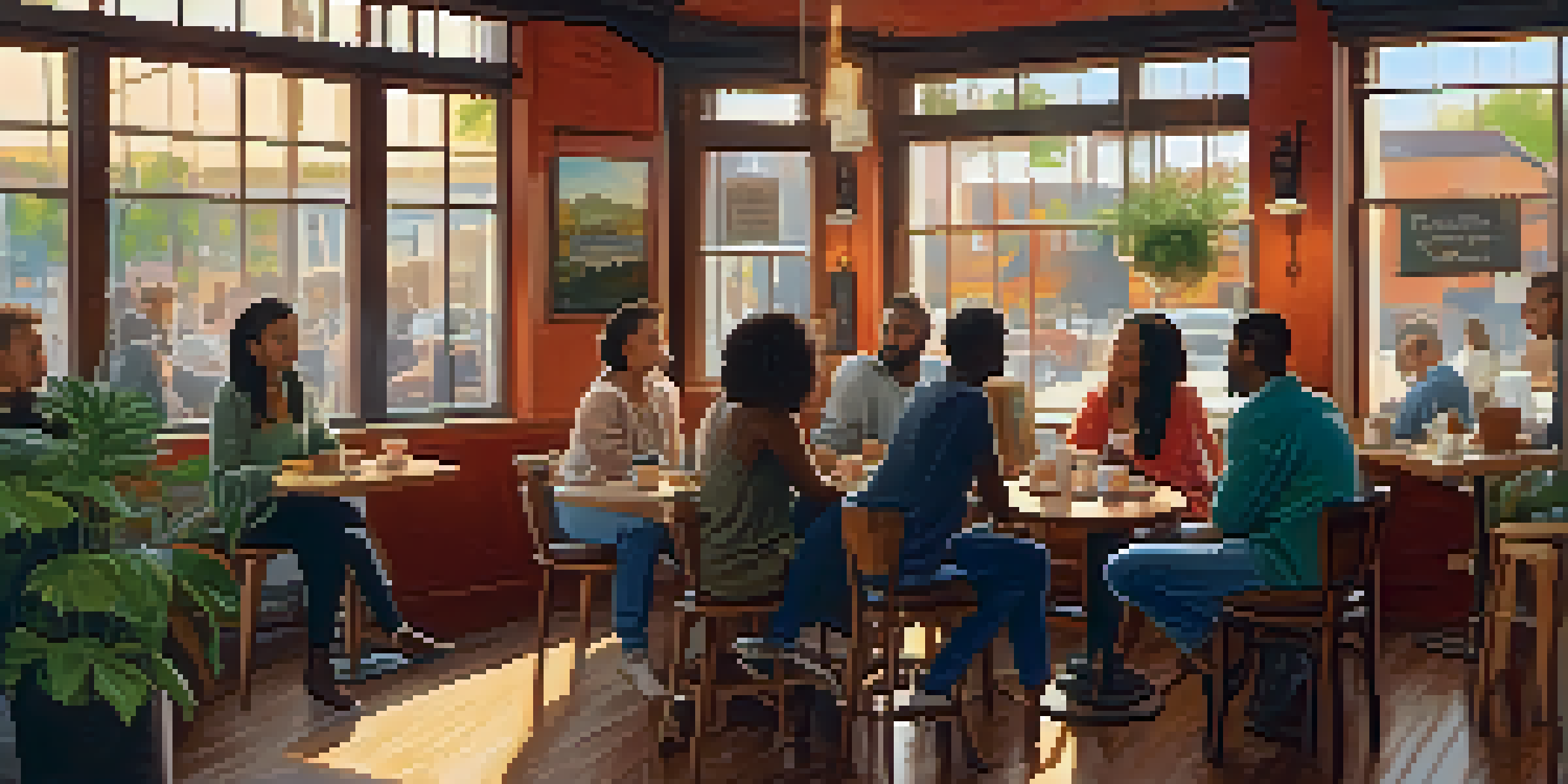The Psychological Benefits of Social Media for Mental Health

Social Media as a Tool for Connection and Community
Social media has transformed the way we connect with others, allowing us to maintain relationships regardless of distance. Platforms like Facebook, Instagram, and Twitter enable users to share life updates, celebrate milestones, and support each other through tough times. This sense of community can significantly enhance feelings of belonging and reduce feelings of isolation, which is crucial for mental well-being.
Social media is not just a tool for connection; it’s a tool for community and support.
Imagine moving to a new city; you might initially feel lonely and disconnected. However, joining local groups on social media can quickly provide you with a network of friends who share your interests. Whether it’s a book club or a hiking group, these online connections often translate into real-life friendships, fostering a supportive community.
Moreover, social media can serve as a platform for marginalized groups to find their tribe, allowing individuals to share experiences, resources, and support. This sense of solidarity can be incredibly empowering, helping people feel less alone in their struggles.
Access to Mental Health Resources and Information
One of the most significant advantages of social media is the access it provides to mental health resources. Many organizations and professionals share valuable information on platforms like Instagram and Twitter, offering tips, articles, and even virtual support groups. This democratization of information can help individuals educate themselves about mental health issues and find the help they need.

Consider a person experiencing anxiety who stumbles upon a mental health advocate’s post outlining coping strategies. This newfound knowledge can equip them with tools to manage their condition effectively. Furthermore, many social media pages focus specifically on mental health awareness, breaking down stigmas and encouraging open conversations.
Social Media Fosters Connection
Social media helps individuals build meaningful connections, reducing feelings of isolation and enhancing a sense of community.
Additionally, social media allows users to find and connect with therapists and support groups that they might not have known existed. This level of accessibility can make a significant difference for those seeking help but unsure where to start.
Fostering Positive Self-Expression and Creativity
Social media platforms often act as a canvas for creative expression, enabling individuals to share their art, writing, or other talents. This act of creation can be incredibly therapeutic, providing an outlet for emotions and thoughts that might otherwise remain bottled up. Whether it’s posting a painting on Instagram or sharing a heartfelt blog post, self-expression can boost self-esteem and foster a sense of accomplishment.
The internet is a powerful tool for bringing people together, sharing experiences, and fostering understanding.
For instance, someone struggling with self-identity may find solace in creating content that reflects their journey. Sharing this content can lead to positive feedback and recognition from peers, reinforcing their sense of worth. This validation can be a powerful motivator and contribute to improved mental health.
Moreover, engaging with creative communities online can inspire individuals to explore their talents further. Collaborations and challenges on platforms like TikTok or YouTube can spark new ideas and encourage users to step out of their comfort zones, ultimately enhancing their self-confidence.
Building Empathy and Understanding Through Shared Experiences
Social media can act as a powerful tool for building empathy by sharing diverse experiences. When individuals post about their struggles, triumphs, or perspectives, it allows others to gain insight into lives different from their own. This exchange of stories can foster understanding and compassion, breaking down barriers that often lead to judgment or isolation.
For example, someone sharing their experience with depression can help others understand the complexities of this mental health condition. Readers who have never faced such challenges may develop a deeper understanding and empathy towards those who do, ultimately cultivating a more supportive environment for all.
Access to Mental Health Resources
Platforms provide valuable mental health information and support, empowering users to seek help and educate themselves.
Additionally, social media campaigns focused on mental health awareness often highlight the importance of kindness and support. By participating in these movements, users can contribute to a culture that values openness and understanding, further promoting mental well-being.
The Role of Online Support Groups and Communities
Online support groups have become increasingly popular, offering a safe space for individuals to share experiences and seek advice. These communities can provide emotional support and practical tips for coping with various mental health challenges. The anonymity of the internet can also make it easier for individuals to open up, fostering honest discussions.
Imagine a person dealing with grief who joins an online support group. Here, they can share their feelings without fear of judgment and connect with others who understand their pain. This shared experience can create a sense of belonging and validation, which is essential for healing.
Moreover, these communities often provide a wealth of resources, from coping strategies to suggestions for professional help. The collective knowledge and experience of group members can empower individuals to take proactive steps toward better mental health.
Encouraging Mindfulness and Self-Care Practices
Social media platforms are increasingly promoting mindfulness and self-care practices, with countless accounts dedicated to these topics. Users can find inspiration in the form of meditation guides, wellness tips, and motivational quotes. This influx of content encourages individuals to prioritize their mental health and adopt healthier habits.
For example, a user who follows a mindfulness account may start incorporating daily meditation into their routine. This practice can help reduce stress and increase overall well-being, showcasing how social media can positively influence lifestyle choices.
Encouraging Creativity and Self-Care
Social media acts as a platform for self-expression and promotes mindfulness practices, contributing positively to mental well-being.
Furthermore, sharing personal self-care journeys on platforms like Instagram can create accountability. When individuals post about their mental health goals, they often receive encouragement from their followers, reinforcing their commitment to self-improvement.
Balancing Social Media Use for Mental Well-Being
While social media offers numerous psychological benefits, it’s essential to find a healthy balance in usage. Excessive time spent online can lead to feelings of anxiety, envy, or inadequacy, particularly when comparing oneself to others. Recognizing when social media becomes detrimental is crucial for maintaining mental well-being.
Consider setting specific time limits for social media use to prevent burnout. Incorporating digital detoxes or regularly evaluating what content you consume can help create a more positive online experience. This mindful approach allows individuals to enjoy the benefits of social media without falling into negative patterns.

Ultimately, being intentional about social media use can empower individuals to cultivate a healthier relationship with these platforms. By focusing on positive interactions and engaging with uplifting content, users can enhance their mental health while still enjoying the connectivity that social media provides.